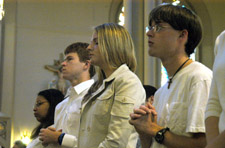News of the pope’s death last Saturday gripped the world in a whirlwind of media clips and remembrances of the Polish pontiff with a soft spot for children.
Loyola, too, greeted the news with immediate action and various emotions.
The Rev. Kevin Wildes, S.J., university president, announced the pontiff’s death to Loyola through an e-mail to the university. He described John Paul II as a man of “deep, personal integrity” who spoke his mind regardless of other people’s views.
University Ministry, along with the Jesuit Center, COMPASS and the Student Government Association, also helped mourn the loss with a memorial service for the pope on Tuesday.
They also tied white cloth to the trees in the Peace Quad and distributed white ribbons to students and faculty to wear. White is the traditional color of the Church and symbolizes life and hope.
The pope’s death stimulated conversations of acceptance, reflection and wonder among students and faculty.
According to the Rev. Peter Bernardi, S.J., associate professor of religious studies, the death of Pope John Paul II was a lesson to mankind.
“I think the pope gave a lesson in courage and patience in the way that he faced his infirmities,” Bernardi wrote in an e-mail. “He chose not to go to the hospital at the end, but to prepare for death at home.”
In an e-mail to The Maroon, Wildes pointed out that the Pope’s death is also a new beginning.
“The pope’s death, like anyone’s death, is a loss. But, it is also a time of joy because he has gone to eternal life with God,” Wildes wrote.
John Paul II’s death, while sad, was not shocking to many people.
“The death of the pope was not shocking to me since, in my own family, I have experienced the death of loved ones,” the Rev. Peter Rogers, S.J., associate professor of modern foreign language and literature, wrote. “Since he [John Paul II] was aged and quite ill, I did not expect a recovery.”
Likewise, Bernardi pointed to John Paul II’s battle with Parkinson’s disease as a reason for the general acceptance of his death.
“The pope has been in declining health for several years with Parkinson’s disease,” Bernardi wrote. “In recent weeks the decline has been precipitous. His death was not a surprise.”
Wildes also pointed out John Paul II’s fading health during Tuesday’s memorial service. He referred to the many media clips of the pope from various years and said the pope’s decline was obvious in the recent clips as compared to the ones from two years before.
“In the last years, he [John Paul II] appeared fragile and weak,” Wildes said.
As John Paul II’s death sank into the minds of the Loyola community, students and faculty embarked on a period of reflection on the papacy of John Paul II.
According to Anna Koehl, communications senior, John Paul II was a man who “stuck to his guns.”
“He stuck to his beliefs and morals,” Koehl said. “And because he did that, people from all over the world respected him. People in Iraq and Mexico and all over the world were mourning him – that’s incredible.”
For Bernardi, John Paul II’s legacy to the world and the Church was his “defense of the dignity of human life in all of its stages – from conception to natural death.”
In addition to acceptance and reflection, students and faculty have begun to look to the future of the Church and how John Paul II’s death could affect it.
For Shannon Derkacht, communications junior, John Paul II’s death might aid the Church by bringing in fresh ideas.
“It’s sad, but at least he isn’t suffering anymore,” Derkacht said. “And his [John Paul II’s] successor might change the things that he missed.”
According to doctrine, the papal conclave, the group responsible for choosing the next pope, has 15 to 20 days from the pope’s death to announce its candidate, which means by April 22, the world should know the next pope.
Bernardi said it wasn’t surprising that his students were curious about the process for selecting the next pope because most had not been born when the last papal conclave occurred.
Although there is no ideal type of pope, Bernardi said the man chosen should be “genuinely holy and an effective witness to the crucified and risen Lord.” He said he doubted the next pope will be an American.
“Given the global role that the United States plays in the world, an American pope would be suspected of partiality, whether justified or not,” Bernardi said.
Regardless of the identity and ethnicity of the new pope, he will have to deal with a multitude of issues, such as the shortage of priests.
“I believe that the new pope could take off where John Paul II began by allowing married priests from Protestantism to enter into the Catholic Church and exercise their priesthood,” Rogers explained. “Since we have married priests in the Catholic Church, why not have more? Why not ordain more married men?”
Sarah Castagnetta can be reached at sjcastag@loyno.edu.






